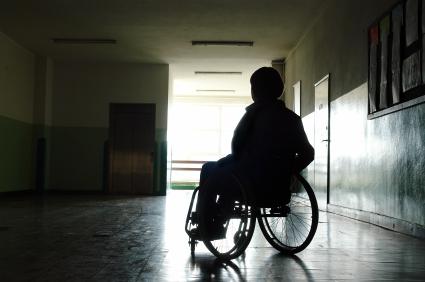High unemployment among the disabled damages economy

It has been estimated that the unemployment rate for disabled people in the most developed countries is roughly twice that for non-disabled people. Throughout the EU member states, disabled people are faced with significant barriers both in finding and holding down a job.
The European Community Household Panel noted that people ‘with a moderate disability’ or ‘a severe disability’, in the 16-64 year age range, have only a 47% or 25% chance respectively of being able to find employment or establish their own business. This contrasts with a 66% probability for a non-disabled person. Recent statistics indicate that 68% of non-disabled people in the EU are employed against only 20% of disabled citizens with about 2.5 million disabled people employed in sheltered workshops.
However, this low employment rate for disabled people is not an indication of any general unwillingness on the part of disabled people to take up employment. Research in the US indicates that some two thirds of disabled Americans – totalling approximately 43 million people – are prepared and willing to take up employment. Of these 82% are willing to give up government benefits to take up full-time positions.
Recent studies in the UK have confirmed these findings indicating that there were some 900,000 disabled people wishing to find work but who were unable to do so for a mixture of physical and attitudinal barriers. Furthermore, although disabled people were around three times more likely to lack employment than a non-disabled person, they were on average three times as willing to work as their non-disabled counterparts.
Given that there are at least 50 million disabled citizens in the EU, over 12% of the total population, it is clear this is an issue that merits serious political consideration.
Indeed, the EU has introduced several instruments and initiatives in relation to this issue, including the European Year for People with Disabilities (EYPD) and a European Disability Action Plan (EDAP), which relate to protecting and promoting the rights and position of the disabled community and integrating disabled people in the workplace. The action plan has the potential to achieve greater harmonisation of policies facilitating the participation of disabled people in the workplace and society in general.
Since the Maastricht Treaty the EU has also engaged in several initiatives in the area of disability such as the European Social Fund (ESF), which provides funding in a range of areas, including programmes and projects aimed at reducing the number of unemployed disabled people and providing support for increased vocational training opportunities.
Another noteworthy development was the European Charter of Fundamental Rights (ECFR). There are a number of important articles in this Charter of importance to disabled people. These include Article 21, which stipulates that people should not be discriminated against on grounds of any disability and Article 26, which relates directly to the integration of people with disabilities stating that:
"The Union recognises and respects the right of persons with disabilities to benefit from measures designed to ensure their independence, social and occupational integration and participation in the life of the community."
Although these are undoubtedly significant steps towards guaranteeing the rights of the disabled community in Europe and therefore most welcome, the ECFR is a purely political undertaking and as such has no legally binding effect.
Therefore, while the ESF and the ECFR are both representative of efforts on the part of the EU to advance the status of disabled people, they are insufficient in themselves. To increase the participation of disabled people in employment, it is essential that disability is ‘mainstreamed’ into the institutions, legislation, policies and programmes of the EU and its member states.
This disability mainstreaming should take into consideration the wide range of diversity within the disabled community. It must also incorporate a dual approach, which will promote disability equality through positive action while simultaneously enabling the supply of individualised and personalised support services.
In this respect, the ratification by the European Community of the United Nations Convention on the Rights of Persons with Disabilities (CRPD) is a positive step. This Convention has been signed by all the EU member states and the EC, the first time that the Community has acceded to a human rights treaty. It has also been separately ratified by 12 member states since its coming into force in May 2008.
The CPRD will require all States parties to make sure their legislation, policies, programs and actions comply with its provisions. In practical terms, this will require ensuring that disabled people are able to enjoy all the rights available to non-disabled people as well as facilitating their access to employment, education, transport and so forth. Furthermore, disabled people will have to be supported in their wish to live independently in the community, instead of separately in institutions as was commonly the case in the past.
However, although this is a positive development, much remains to be done. As the European Disability Forum (EDF) warns:
"It is now crucial for the EU Institutions to work on the details of implementation and to ensure that a strong independent mechanism for monitoring implementation will be established soon: this mechanism must be free from all undue pressure."
It is essential that the CRPD is used to ensure that members of the disabled community are given the opportunity to participate as members of the workforce on an equal basis with non-disabled people. Furthermore, disabled people must be at the centre of any policy, process or programme initiatives to improve their economic, political and social participation.
Society’s failure to facilitate the incorporation of disabled people into the labour market leads to negative economic, social and psychological repercussions, not only for disabled people, but also for their families and carers and society as a whole.
